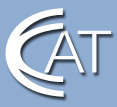Explore high-paying careers in clean, high-tech Connecticut manufacturing.

Educators: Externships
Work-based Learning Projects
Project: Special Ultrasonic Plastic Welding for Packaging
Name of NGM Educator: Richard Weber, Ph.D., Automated Manufacturing Professor |
Name of Host Company: Branson Ultrasonics |
Grade Level: 1st and 2nd year college students |
Student Work Types: Type 1: Lab A - Utrasonic Welding of Unique Plastic Packaging |
Task "A" Abstract: The 1 st year students in the Manufacturing Processes course are given special plastic components for packaging an electronic device and asked how the plastic components could be assembled to house the electronic device. Students generate ideas and consider the pros and cons of their ideas. After the idea generating session, students are asked to consider the technology of ultrasonic welding. Since this is generally a new area for them they must research the technology and prepare a report. After the reports are completed they are taken into the lab and given the opportunity to actually operate the ultrasonic welding equipment. Task "B" Abstract: The 2 nd year students in the Materials of Engineering course are given the lab assignment to test the tensile properties of various metal alloys. Using the samples from Branson Ultrasonics the students complete their lab assignment. Based on the test data they try to identify the metal alloys and prepare a written report of their findings. After reviewing the reports the students are given the identification of the alloys tested. Further discussion about the lab results continues during a follow-up class and the students learn that tensile properties of materials are not sufficient to identify a material.
|
Task "A" Objectives: 1. Students learn how to generate ideas in a group setting. 2. Students begin to understand that new manufacturing technology is not always evident through idea generation discussions. 3. Students prepare a written research report with sufficient detail to understand a new technology. 4. Students have a hands-on experience with new equipment in a lab setting and manufacturing an industrial product. Task"B" Objectives 1. The students are able to prepare a tensile test procedure for metal alloys. 2. Students can apply their knowledge of mechanical properties to characterize the material. 3. Students can collect, organize, and analyze lab data. 4. Students prepare a written report to communicate their findings. |
Task "A" Description and essential outcomes: Task A Description: The 1 st year students in the Manufacturing Processes course are given special plastic components for packaging an electronic device and asked how the plastic components could be assembled to house the electronic device. Students generate ideas and consider the pros and cons of their ideas. After the idea generating session, students are asked to consider the technology of ultrasonic welding. Since this is generally a new area for them they must research the technology and prepare a report. After the reports are completed they are taken into the lab and given the opportunity to actually operate the equipment. Task B Description: The 2 nd year students in the Materials of Engineering course are given the lab assignment to test the tensile properties of various metal alloys. Using the samples from Branson Ultrasonics the students complete their lab assignment. Based on the test data they try to identify the metal alloys and prepare a written report of their findings. After reviewing the reports the students are given the identification of the alloys tested. Further discussion about the lab results continues during a follow-up class and the students learn that tensile properties of materials are not sufficient to identify a material. |
Resources Required: All materials and equipment have been supplied by Branson Ultrasonics. |
Prerequisites required: Task A Requirements: This is an entry level course and no prerequisites are needed. Word Processing skills are recommended. Task B Requirements: This task requires knowledge of material properties and college algebra. Word Processing skills are needed.
|
Work Environment: Work was produced both through company activities and the NVCC Manufacturing Processes and Materials lab. |
Educator's Comments: The most effective company projects and activities are ones that can be directly transferred to a school’s lab facilities. This requires that the company is willing to help with supplies, maintenance, and equipment. We have been very fortunate that the Branson company has been extremely supportive with people, supplies, maintenance, and equipment.
|





